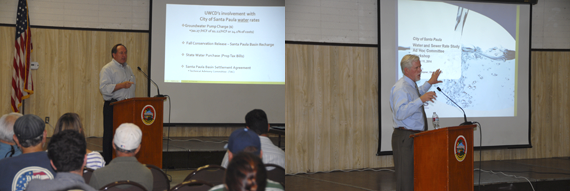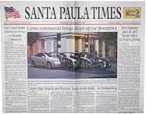
|
Left Mike Solomon, general manager of United Water Conservation District, addressed the drought as well as billings paid by water consumers as pumping and other charges. Right Greg Clumper of NBS, the city’s longtime water consultant, explained the study of sewer and water charges as well as options for future billings. |
Water, sewer rates workshop brings
crowd to Community Center
August 15, 2014
By Peggy Kelly
Santa Paula News
A crowd of about 200 people filled the chairs while others stood against the walls Monday evening at the Community Center at a City Council Ad Hoc Committee workshop to hear what city leaders have in store for escalating water, sewer and sewer surcharge rates, the latter two among the highest in the county.
Contrary to an initial city statement, the workshop was not taped for later cable television or city website broadcast. It is unclear if an audiotape of the session will be available to the public.
“I’m glad you’re here showing interest,” said ad hoc committee member and Mayor Rick Cook. “We have a lot of information given to us,” as well as meetings with “our advisor... we’ve been meeting with our consultant, I’ve been to Ventura,” and committee member and Councilman Bob Gonzales, “has been to other cities getting input... “
“It is very, very important you are here tonight,” said City Manager Jaime Fontes, and “We are bringing back what we said we would from the last meeting,” a session that was held in May 2013.
The public has been upset about spiraling rates and Fontes noted there have been complaints about paying sewer surcharges for water used for landscaping purposes that is not processed at the wastewater plant.
Questions have also centered on all households no matter the size paying the same basic rates for sewer service which some have claimed, “is unfair... there were a lot of good arguments we went into,” that were factored into the study.
First up was a presentation by Mike Solomon, general manager of the United Water Conservation District, who explained the function of the district, drought conditions that impact supply and increasingly stringent environmental constraints placed on the pumper.
He noted that much of the cost FOR water delivery to customers is related to the cost of maintaining related - and aging - infrastructure.
“The cost of the water is not the water itself, it’s the infrastructure... the water is free.”
But not without cost: Solomon noted that for each Hundred Cubic Feet (HFC, equals 748 gallons) of water purchased by area residential customers monthly, “about 24.1 percent of the total cost, 27 cents,” goes to UWCD.
The agency, he noted, has nothing to do with sewer charges or the sewer surcharge.
Cook said UWCD has raised its pumping fee 430 percent since 2007 and Solomon noted the agency has actually raised it by 600 percent over the last decade.
When Greg Clumper, the city’s longtime water consultant, spoke the crowd started to become restless, several calling out questions and comments which Cook said would be taken later.
Clumper said the city plans to adopt a model similar to the one being used in Ventura to calculate sewage processing surcharges; at the May 2013 meeting he stated that model has been adopted by the city originally in 2008 but it was never implemented.
Monthly sewer rates are now $77.21. In addition, residents pay $1.12 per 100 cubic feet of water used per month.
Clumper said under a new system, sewage surcharges would be calculated based on how much water is used during the wetter winter months, when most water consumption is inside the home for needs that do require sewer processing.
Interim Public Works Director Brian Yanez said considering the drought a method would be devised to calculate winter usage perhaps going back several years when there was more rainfall.
Santa Paula’s water rates have gone from $17.82 a month during the 2009-10 fiscal year to $24.57 a month now for users with a 5/8 inch meter.
Clumper presented several options (the report is available online at the city website) that would create tiers of usage - the more used the higher the bills - while raising basic rates for water and lowering the basic rate for sewer, which would see a higher surcharge for winter rate usage.
The present 5/8-inch meter charge of $24.57 would increase 8 percent or $1.97 to $26.56; the 3/4 inch meter would increase 13 percent from $36.89 to $41.70, a $4.80 monthly increase.
On the three tiered rates, those using up to 11 HCF a month would get a Tier 1 decrease of 4 percent, and pay 8 cents less of the present $2.43 to $2.35 HCF; Tier 2’s 12 to 17 HCF would pay $2.94, a 21 percent increase or 51 cents per HFC and Tier 3 would pay 51 percent more, a $1.24 increase that would bring their HFC cost to $3.67.
The Uniform Rate for all usage would be a 12 percent increase or 30 cents on the present rate.
Sewer rates would see its residential base charge decreased 3 percent, the $77.21 becoming a flat $75 a month, but the surcharge per HCF would rise 28 percent, an added 31 cents from $1.12 HFC to $1.43 HFC.
Good news was that Yanez said city utility billing would be easier for customers to understand.
Several in the crowd were critical of the city’s lack of information on plans to lower sewer fees as well as questions of leaks and billing mistakes. They also questioned financing of the city’s privately owned wastewater treatment plant that was built for future capacity that has not yet materialized.
Ginger Gherardi, a candidate for City Council in the November election, said, “It’s a zero game” without more action on the costs related to building the sewer plant.
She noted the $60 million wastewater recycling plant - open since June 2011 and privately funded through a 30-year plan - could ultimately cost the city $125 million.
“You need to look at how you’re going to reduce that cost,” Gherardi said. “Until you do that, it’s a zero game... it’s not going to change anything. There is a ridiculous rate of 8 percent,” interest being paid on the plant that must be reduced.
“When you talk about lowering costs,” she noted, “it is absolutely unfair for the public to be put in that position... “
She also urged that discussions be made public as there is a misconception the city is “just moving the deck chairs on the Titanic... “
“The public,” said Cook, “can’t be told everything we’re doing,” but the city has been working diligently to lower those costs, including trying to buy the sewage plant up front.
Making some things public, he noted, would hurt the city’s bargaining position with those it is negotiating with.



